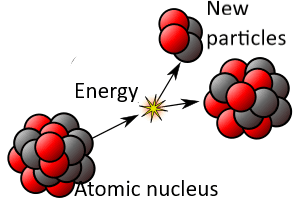In classical physics, events are random only due to insufficient information. Let’s take the example of a coin toss. With an ordinary coin, there’s a 50% chance of heads and a 50% chance of tails. We say that this outcome is “random.”
But if we had enough information about the initial position of the coin, the forces that our fingers exert on it, the air resistance, the distance it must fall before landing, and so on–with sufficient information, we could predict the outcome. The outcome wouldn’t be random at all. The problem is really that the causative factors are too hard to measure. They are hidden to us. Physicists call these hidden causes “hidden variables.” In summary, in classical physics, events which appear to be random are actually just a comment on our ignorance. Randomness due to ignorance is called “classical randomness.”

[Revision of the original image by Kjerish – Own work, CC BY-SA 4.0, https://en.wikipedia.org/wiki/Radioactive_decay]
